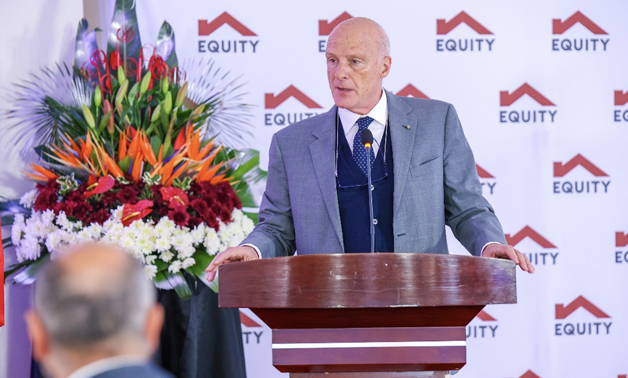
 Italian Ambassador to Kenya, Roberto Natali making his
address during the leather industry stakeholders networking meeting at Equity
Centre/HANDOUT
Italian Ambassador to Kenya, Roberto Natali making his
address during the leather industry stakeholders networking meeting at Equity
Centre/HANDOUTEquity Bank has stepped into a pivotal role as a financial catalyst for a partnership between Kenya and Italy aimed at rejuvenating the country’s once-thriving leather and tanning sector.
The bank has pledged strategic support to Italian investors eyeing collaborations in Kenya, as part of a broader initiative to strengthen the industry and foster sustainable economic growth.
This initiative was spotlighted during a high-level stakeholder meeting hosted at the Equity Centre in Nairobi, where Italian Ambassador to Kenya, Roberto Natali, lauded the partnership as a “landmark occasion” in deepening bilateral economic ties.
“With me here is a delegation of leather industry experts and players from Italy, ready to explore ways to build capacity, establish more tanneries and help develop and maintain an efficient leather supply chain in East and Central Africa,” Ambassador Natali said. “These efforts are aimed at adding value to the over five million animal skins that go to waste yearly in Kenya.”
The ambassador reiterated Italy’s commitment to transfer knowledge, technology, and best practices to Kenya’s leather sector — a move he said would help transform the country into a regional hub for leather production.
“Kenya, with its abundant livestock and growing industrial base, is uniquely positioned to become a key player in the global leather market,” he added.
Officials from the Kenyan government welcomed the initiative, expressing their support and commitment to developing the leather value chain.
Livestock Principal Secretary Jonathan Mueke emphasised that the government recognises leather as a priority value chain for job creation, particularly among the youth.
Kenya Leather Development Council CEO, Dr. Isaack Noor, highlighted ongoing efforts to improve the supply and quality of hides and skins through skills training, infrastructure development, and global trade partnerships.
“We are developing infrastructure such as the Kenanie Leather Industrial Park in Machakos County to support smallholder farmers and facilitate aggregation. Our goal is to ensure an enabling environment for large-scale investment,” said Noor.
On the financial front, Equity Group’s Chief Strategy Officer, Brent Malahay, detailed the bank’s role in unlocking the potential of Kenya’s leather sector under the Africa Recovery and Resilience Plan (ARRP).
“Equity is committed to supporting key value chains, and leather is a major subsector with untapped opportunity,” Brent said. “With a strong ecosystem of tanneries, slaughterhouses, and microenterprises already in place, we are well-positioned to catalyze growth in this sector.”
He cited Kenya’s competitive advantage in livestock production, combined with Equity’s financing, insurance, and business development support, as key enablers for turning the country into a regional or global leather hub.
The bank’s value proposition includes financing opportunities for 13 registered tanneries with a combined annual capacity of over 30,000 tons of hides and more than 15 million skins, as well as over 2,000 slaughter facilities across the country.
Representatives from prominent Italian organizations — including UNPAC (National Association of Italian Leather Chemicals Manufacturers), UNIC (Italian Tanners’ Association), ICEC (Institute of Quality Certification for the Italian Leather Sector), and ASSOMAC — expressed optimism about the partnership and the potential it holds for both countries.
To gain deeper insight into the local leather market, the Italian delegation conducted field visits to Kenyan livestock farms and processing facilities, including Farmers Choice Ltd, Reddamac Leather Centre Ltd, Ikwetta Ltd, and Alpharama Ltd.














